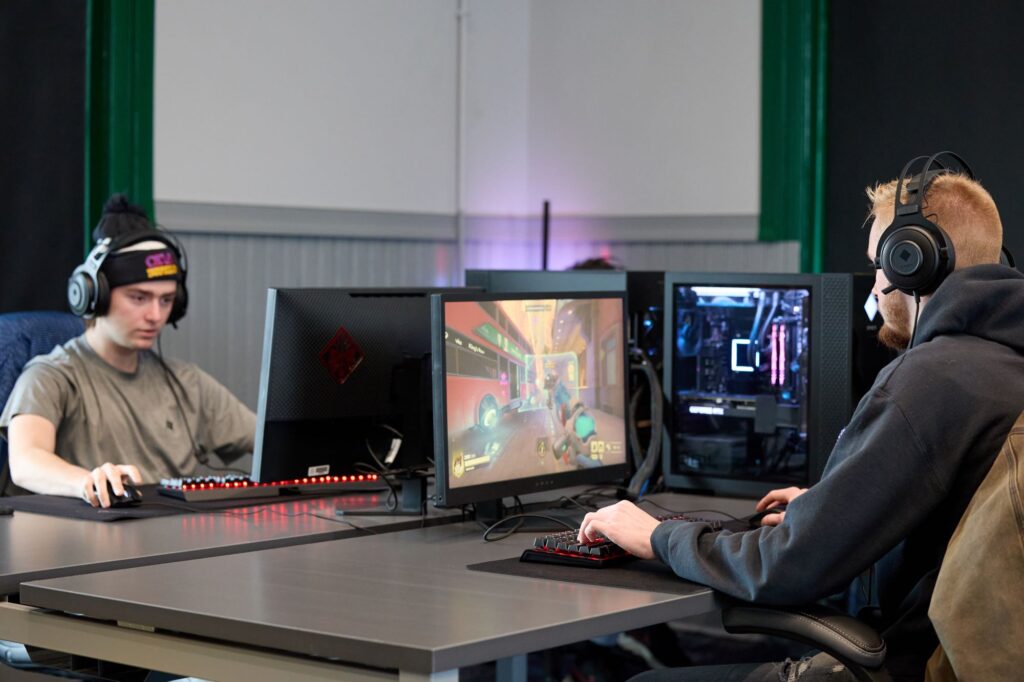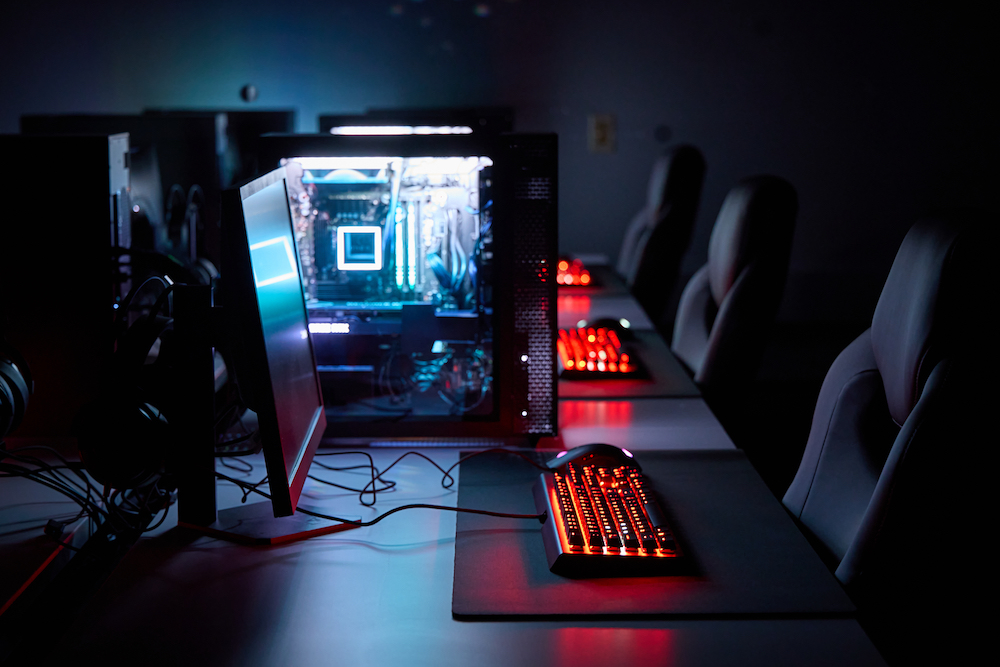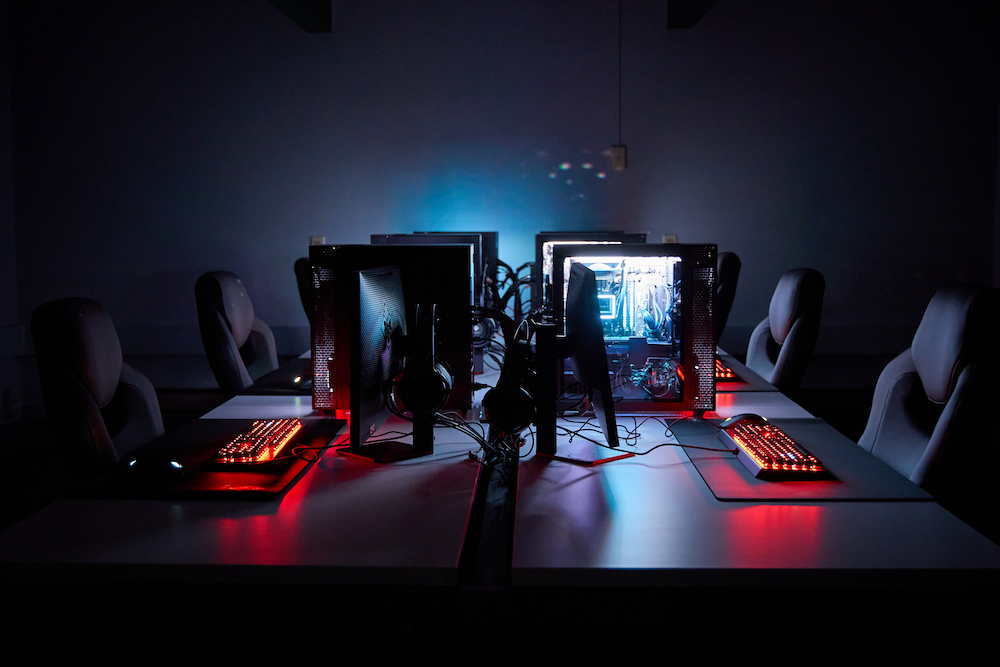A gaming PC often has much better performance that allows it to run and store multiple different high-level games to play at any given-time than a standard PC. A common problem with ‘regular’ PCs is ‘lag’, meaning that the video card in the device cannot keep up with the demanding processes of some video games. Gaming PCs are equipped with top-end video cards, good memory storage, and CPUs that last much longer than a standard PC.
Gaming PCs
Gaming PCs are at the core identity of any esports facility—they empower users to play the games they love. At Esport Supply, we are vendor-neutral and look to make the best fit for your facility based on the needs of your community and staff. Through our upfront Needs Analysis, we provide gaming PC & peripheral procurement, plus onsite installation to ensure our clients have a partner throughout their entire build process.

Our Vendor Partners
Gaming PCs
- ASUS (Predator)
- Dell (Alienware)
- Lenovo (Legion)
- MSI
- Razer
Peripherals
- Corsair
- Hyper X
- Logitech
Our Process
Through our in-depth Design & Build process, we go through a Gaming PC Needs Analysis, which will help investors determine the right PCs for their space. We take into account coach & gamer preferences, price, supply chain availability, and aesthetic to deliver a detailed recommendation for our stakeholders.

Why Esport Supply?
-
Single-Source Provider
Don't deal with the hassle of multiple vendors. We have built a team and process to handle your facility build from planning, design & build to procurement and support.
-
Speed & Cost Savings
When you work with multiple providers, there are additional meetings and coordination needed to successfully launch an esports facility. This additional time adds up to slower openings and more cost.
-
Experience
We have worked with over 60 organizations to assist in building out their esports programs. Take advantage of best practices developed through our industry leading experience!
-
Team
The team at Esport Supply is made up of former university club founders, leaders, and national champions. They provide real world insights to support the feasibility study data.
-
Reach
We have worked with clients across the USA, Canada, and Asia; providing our experience and insights to clients on a global scale.
Book A Consultation With Our Esports Experts
Frequently Asked Questions
Depending on the level of use, we recommend refreshing your PC every 3 to 5 years, per most manufacturers recommendation.
A gaming PC for an esports arena is made up of many factors that determine the quality of the build. The key components of a PC that will have the most impact are the Graphics Card, Power Supply, Processor, Memory Card, and Storage. We’ll talk briefly about each component to describe the importance of it.
- Graphics Card: The graphics card in a gaming PC is the component that allows you to play graphically intensive games. Without a dedicated graphics card installed in your machine, your PC will struggle to load modern games that use 3D graphics and high-definition textures, and may not even launch them at all. For this reason, it is the most important component in a gaming PC, and will typically be the most expensive.
The most popular graphics cards are NVIDIA, labelled with two key indicators, the first 2 numbers and the last 2 numbers. The first 2 numbers call out what generation the video card is from, whereas the last 2 numbers indicate the version from that generation. The higher the number for both, the better performance. For example, a 1660 video card is ‘worse’ than a 2080 video card, and a 3050 video card is ‘worse’ than a 3080 video card. - Power Supply: The Power Supply is what powers the components inside and ensures the reliability and longevity of a system. A low-quality power supply can fail unexpectedly, taking other components with it if the current or voltage it’s supplying to your motherboard, graphics card, or storage drives spikes. Taking this into consideration, a high-quality power supply is always advised whenever purchasing a gaming PC.
- Processor/CPU: The processor, sometimes referred to as the CPU, is the brain of the computer. Without it, your machine wouldn’t turn on and couldn’t do anything. Games, especially the well-optimized ones, don’t tax the CPU nearly as much as the graphics card. Typically the lower the frame rates of your games, the lower the stress on the CPU, and that stress scales linearly as your frame-rate goes up. This is important because it means you need to be sure your pairing of graphics cards and processors doesn’t hit what is called a CPU “bottleneck”, or a point where the video card is waiting on the CPU to serve frames to your screen. All this is to say that when building or choosing a PC, you will want gaming PCs that support the latest models of CPUs if possible.
- Memory: Memory is often also called RAM or Random Access Memory. Having higher amounts of RAM will make any PC run faster and smoother, so look for PCs that have access to multiple ‘sticks’ of RAM, or large quantities of RAM, such as 32 Gigabytes (GB). Investing in good quality memory space also allows for much smoother broadcasting and streaming, as most of the game’s load will be put on your video card’s memory, or VRAM, so the extra space will allow both to run in tandem.
- Storage: Storage within a computer is vastly important to the longevity of a system and allows the user to download many different games, applications, and media without having the computer slow down. These are often categorized into either Hard Drives (HDs) or Solid State Drives (SSDs). For gaming PCs, especially for esports arenas, you will almost always want a SSD for your PC, as these load games faster, allow for faster switching between applications, and speed up processes within the storage of your PC.
